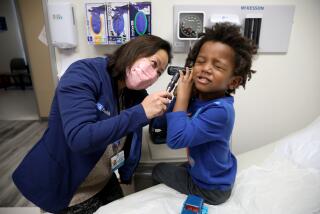Op-Ed: Health shouldn’t be based on where you live
Strand by strand, my younger sister has been pulling the threads of her life back together after a couple of lost decades. A year ago at age 52, and with the financial support of our extended family, she found housing in Virginia, where we were both born and raised, and she has since gotten a part-time job and enrolled in community college classes. Yet her challenges haven’t ended.
Six months ago, things nearly fell apart when she suffered two small strokes. Although she got emergency hospital care and recovered, the cost of drugs to prevent another stroke has blown a hole in her down-to-the-dollar budget. It was a wake-up call to her and our family about how vulnerable she is without health insurance. The toll is both physical and mental; she’s always worrying about the “what ifs.” She’s become so worried about it that she’s given up bicycle riding, fearful she’ll have an accident.
Her situation would be very different if she lived in my adopted state of California. When California rolled out the Affordable Care Act last year, it accepted federal funding to offer Medicaid — free public health insurance for the poor — to more people. Almost any Californian earning less than $16,105 a year can enroll. Here, my sister would be insured under Medi-Cal (what Medicaid is called here). Here, she would have had access to preventive care in advance of her stroke. Here, she’d have a $1 co-pay for prescriptions. Here, she would be getting follow-up treatment for her hypertension and checked for signs of diabetes.
In Virginia, which refused federal funding to expand Medicaid, it is a different story. Unless adults have dependent children, they can’t enroll in Medicaid insurance at all, no matter how poor they are. Similar limits still exist in 22 other states that chose not to expand their Medicaid programs.
By contrast, what California achieved in the first year of the ACA is inspiring: health insurance coverage for an additional 3 million people. It took enormous effort on the part of the state, community organizations and philanthropic partners. But it paid off: In the first open enrollment period, California cut its rate of uninsured in half, from 22% of the state’s population to 11%.
The newly insured got coverage in myriad ways: through the Covered California marketplace, employers’ plans, individual policies and other group policies. But more than half of the newly insured — 1.6 million people — signed up for Medi-Cal.
Last summer, for the eighth year in a row, the California Wellness Foundation and Field Poll surveyed registered voters on healthcare. The trend lines are strong: Voters here like the Affordable Care Act. Even in former pockets of opposition to healthcare reform — the Central Valley and Inland Empire — most voters support the ACA now that they’ve seen it in action, and 43% of those surveyed say the ACA should be expanded.
That’s not to say that everything is rosy. The federal government’s rollout of the ACA was deemed unsuccessful by 46% of the states’ voters, though only 30% said the same about California. Costs are still a worry too: 46% of voters say they have difficulty paying for healthcare, and 47% said their health costs went up last year.
But one thing that was striking to me was how Medi-Cal’s broadening reach is seen as vital by the voters in our survey. Some 62% of respondents said Medi-Cal was “important” or “very important” to themselves or members of their family. And there was another glimmer of hope: Just over half of them said they were open to the idea of extending preventive health benefits to undocumented members of our community.
I see all these findings as indicators that California has made great strides toward creating a culture of coverage, in which there is a broad understanding that having insurance is important for everyone. We can do even more during the next open enrollment, which started Saturday. There are still millions of Californians eligible for premium subsidies or Medi-Cal who haven’t yet gotten health insurance.
Insurance coverage matters. Studies have shown that people with insurance are three times more likely to be screened for breast cancer, cervical cancer or hypertension. They land in the hospital for avoidable conditions half as often. Having health insurance reduces mortality rates 10% to 15%.
In health policy circles, we talk a lot about “social determinants of health.” These are the conditions of a person’s life — from ethnicity and gender to income and nationality — that result in avoidable health disparities. By expanding insurance access, the ACA has the potential to be a great equalizer, to make the U.S. a country in which where you live doesn’t determine your healthiness.
But we’re not there yet, as I am reminded when I think about my sister in Virginia. A months-long political battle there fizzled out in September with no real progress on Medicaid expansion. So in a few weeks, I’ll make sure my sister gets enrolled in a plan through healthcare.gov. But even if she qualifies for premium subsidies, it will be beyond her financial reach, which is why expanding Medicaid is such an important component of the Affordable Care Act.
My sister is lucky. She has a loving family that is able to help her pay for access to healthcare. But what about the millions of others in Virginia and 22 other states who, simply by virtue of where they reside, will be forced to decide between filling a potentially lifesaving prescription and feeding themselves and their families.
Judy Belk is president and chief executive of the California Wellness Foundation, an independent foundation making grants to promote health, wellness education and disease prevention for Californians.
Follow the Opinion section on Twitter @latimesopinion
More to Read
Start your day right
Sign up for Essential California for news, features and recommendations from the L.A. Times and beyond in your inbox six days a week.
You may occasionally receive promotional content from the Los Angeles Times.






